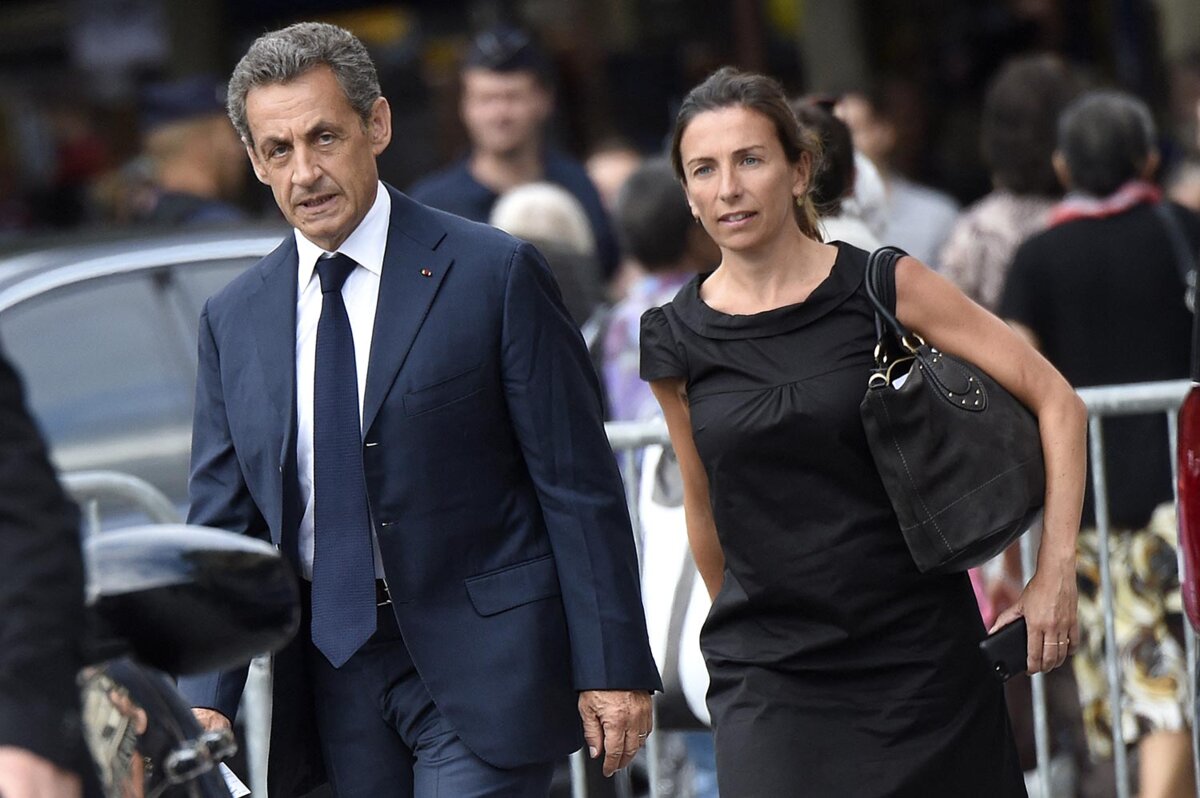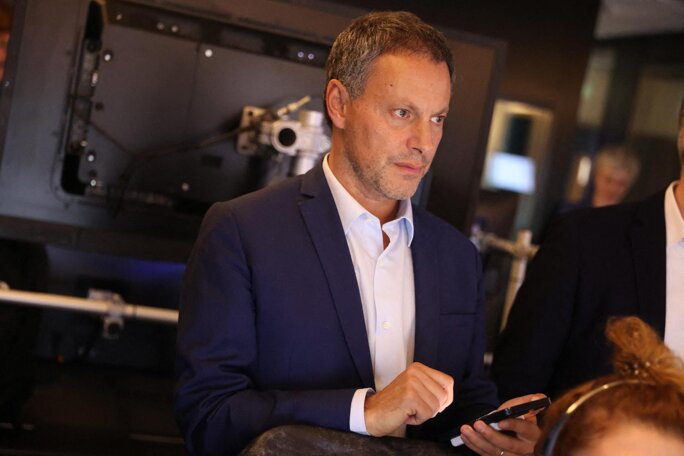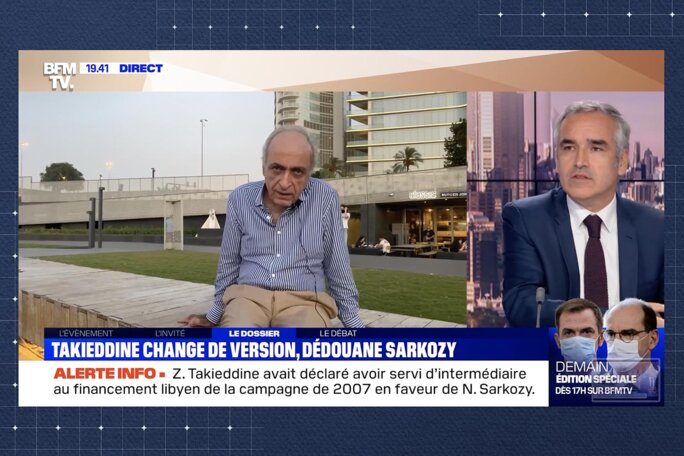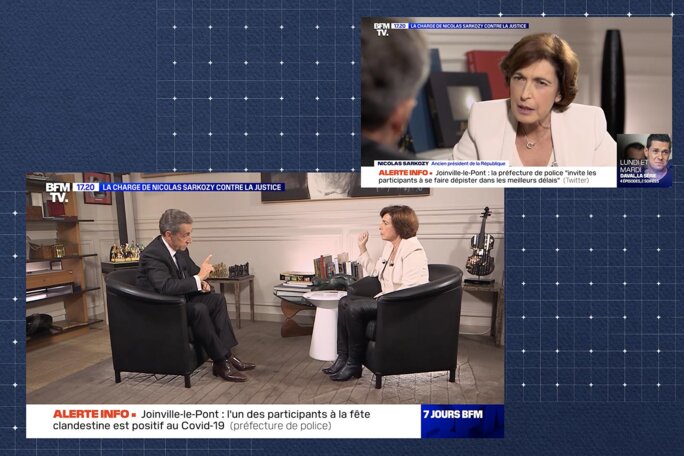On October 16th 2020, Mediapart reported how former French president Nicolas Sarkozy had again been placed under investigation on suspicion that his 2007 presidential election campaign had in part been funded by the regime of Libyan dictator Muammar Gaddafi.
The judicial investigation into the suspected Libyan funding of Sarkozy’s successful 2007 election campaign was opened after a series of investigative reports published by Mediapart, and notably the revelation of a document issued by the Gaddafi regime approving the illicit funding.
Already under investigation in the same judicial probe for “illicit funding of an electoral campaign”, “receiving and embezzling public funds” and “passive corruption”, Sarkozy was, in October 2020, then also placed under investigation for “criminal conspiracy”.
Under French law, to place a suspect under investigation, which can be accompanied by restrictions on movement or contacts, the magistrates in charge of a probe must demonstrate that they have serious or matching evidence that the individual has committed a crime.
Subsequently, in August 2023, he and 12 other people, including three who served under him as ministers, were finally charged over the illegal Libyan funding of the 2007 campaign, and sent for trial. The case is due to be heard in January next year.
Back on that same Friday, October 16th 2020, Ruth Elkrief, a veteran news presenter and political interviewer for French rolling news channel BFMTV, sent Sarkozy a message through his media relations manager, Véronique Waché. “Dear Véronique,” it read, “I’m here, I’m thinking of you, and if you want to express yourself I’m at your disposal, we can set up what you like! Big kisses and pass on my best regards to NS.”
A few minutes later, Marc-Olivier Fogiel, the managing director of BFMTV, also sent a message to Waché, who was hired by Sarkozy as of 2012, at the end of his presidential term. “Can you call me?” Fogiel asked Waché, adding that he wanted to sort out details of something that was not specified, signing off with “Kisses Marco”.
The plot ‘to save’ Nicolas Sarkozy
One month later, on November 11th 2020, BFMTV broadcast a 32-second statement from Ziad Takieddine, a Franco-Lebanese businessman who acted as an intermediary in the negotiations between Sarkozy and the regime in Tripoli, in which he retracted previous damming testimony against the former French president.
Takieddine is a key witness in the Libyan funding case, having told both the magistrates leading it, and also the media, including Mediapart, how he ferried millions of euros in cash from Tripoli to Paris in suitcases, recounting a delivery to Sarkozy in person on one occasion, and to the latter’s chief of staff Claude Guéant on several others. Takieddine, who for years had acted as a business and diplomatic intermediary for Sarkozy’s political team, said he transported the cash sums in late 2006 and early 2007.
But in an operation dubbed “To save Sarko” and mounted by a small group centred around Michèle “Mimi” Marchand, a paparazzi agency boss and an influential PR fixer to politicians, and who is close to Sarkozy, Takieddine agreed to retract his earlier statements in exchange for payment. The plan was for Takieddine to make a statement to camera in which he would deny that Sarkozy ever received funding from the Gaddafi regime. After haggling negotiations, the video was to be broadcast by BFMTV, and a far longer interview was to be published in the French weekly magazine Paris Match.
His statement was filmed in the style of an interview in Beirut, in his native Lebanon, to where he had fled from France after a French court handed him, in June 2020, a five-year jail sentence in a separate corruption case, dubbed the “Karachi affair”. In the brief video, the ruined middleman, sitting on a wall close to the seafront, retracted his accusations against Sarkozy. “I confirm that it's not true,” he begins, without any question heard on tape. “Mr Sarkozy did not have Libyan financing for the presidential campaign, neither could Mr [Muammar] Gaddafi have done it because he never did it.”
In parallel to the video, a lengthy article was published the following day, November 12th 2020, in Paris Match, in which Takieddine said had never delivered Libyan money to Sarkozy (contrary to what he had previously admitted, first to Mediapart, and finally to judges investigating the Libyan funding case). Sarkozy was at the time a member of the supervisory board of the Lagardère group, owner of Paris Match (he has since become a director of the group, now owned by French tycoon Vincent Bolloré).
Takieddine later disowned his retraction, and a judicial investigation was opened into witness tampering. The principal suspects, placed under investigation, were paparazzi agency boss Michèle Marchand; Noël Dubus, a convicted fraudster and former police informer who is suspected of leading the logistics of the operation; Arnaud de la Villesbrunne, a former PR agency director with links to Sarkozy’s conservative Les Républicains party and who is suspected of issuing false invoices for the operation, and Pierre Reynaud, a wealthy property developer.
The examining magistrates in charge of that investigation have estimated that 600,000 euros in cash was paid out (for legal fees, travel etc.), while seized documents have revealed that a sum of four million euros was promised to Takieddine.
Text messages that illustrate an extraordinary connivance
During questioning in May by anti-corruption police appointed the witness tamperingcase , Véronique Waché insisted she did not know in what conditions Takieddine’s retraction had been organised. “At the time I knew nothing about it,” she said in her statement. “I’m not a journalist, I’m a communicator [in public relations], so my job is to react, to accompany […] So no, I don’t have any details, what I saw was quite a strong statement by Takieddine concerning Nicolas Sarkozy, and that’s all.”

Enlargement : Illustration 1

Evidence extracted from her mobile phone showed how the management of BFMTV became mobilised to help Sarkozy, and on occasion Waché was involved in orientating the reports broadcast.
Immediately after Takieddine’s retraction was aired by BFMTV as an “exclusive”, on the evening of November 11th 2020 and before Takieddine’s more detailed interview with Paris Match hit newsstands the following day, Sarkozy announced on Facebook that he was filing a request before the judges in charge of the Libyan funding probe to annul their placing of him “under investigation”. Sarkozy added: “The judicial investigation, opened on the basis only of the lying statements of Ziad Takieddine, today finds itself in a complete impasse.” The investigations into the witness tampering found a first version of the Facebook post on Waché’s mobile phone which had been prepared that very morning.
But the probe has also found a trail of text message exchanges before and after the video was broadcast which demonstrate an extraordinary connivance between BFMTV and the Sarkozy camp.
In one, Ruth Elkrief appears to alert Waché that the first presentation would be at “6.10pm”. Waché then contacted French daily Le Figaro and news agency AFP: “BFM and Match are coming out with very strong things where TAKIEDDINE [sic] clears Sarkozy’s name in the Libyan affair,” she wrote, adding that “Potentially, it’s the whole affair that collapses”.
At 6.43pm, Waché wrote to Elkrief: “Hi Ruth can you call NS? Kisses.” Elkrief calls Sarkozy, as asked, a half-hour later, and the two talk for a little more than nine minutes.
At 7.11pm Marc-Olivier Fogiel sent Waché a copy of the article then published on BFMTV’s website under the headline: “Libyan funding: Ziad Takieddine, the principal accuser against Nicolas Sarkozy, retracts”.
“Seen,” Waché replies. “We don’t rule out that NS speaks out on RUTH’s [programme]. It’s very strong. NS reaction on Facebook.”
“Super,” replies Fogiel. “You let me know?”
Waché: “Yes, we’re thinking about it. What time [for broadcast] seems best to you?”
Fogiel: “If he speaks with Ruth, we’ll broadcast it multiple times. So the first broadcast is of little importance, I was going to say, but it could first be 7pm for example […] what would be your time plan?”
Waché: “The Castex thing bothers me a bit [editor’s note, then prime minister Jean Castex was due to hold a press conference on November 12th]. But at the same time, one should strike while the iron’s hot. NS calls RUTH.”
Fogiel: “In that case it should be done tomorrow morning and be bashed out as soon as it’s ready. Or otherwise at length in her Saturday programme and we bash out extracts beforehand.”
Waché: “Yes, perhaps best. We’ll record Friday morning.”
Fogiel: “Yes, we’ll bash out as of Friday afternoon and broadcast Saturday and all weekend.”
A few minutes later, Waché sent another text message to Fogiel, instructing him: “Call NS.”

Enlargement : Illustration 2

As planned, Sarkozy was interviewed by Elkrief on November 13th. In an exchange lasting 45 minutes, he spoke of his “cold anger” about which, he said, no-one could imagine the “deepness and strength”. He asked whether it was normal “that a former French president be dragged through the mud”, even questioning whether France was still “a state of law and a democracy”. He claimed that the judicial investigation into the suspected Libyan funding had been opened “on the basis only of the allegations of this individual”, referring to Ziad Takieddine.
The management of BFMTV sought to find out if the interview, which was picked up across the media, pleased Sarkozy. Immediately after it was broadcast, Arthur Dreyfuss, chief executive of Altice Media, owner of the channel, contacted Waché by text message. “Ruth and Marco very satisfied,” he wrote, “I hope you and the boss also.”
“Oh, super,” she replied. “Yes everything went very well! Important moment it seems to me!”

Enlargement : Illustration 3

Elkrief then also contacted Waché. “Everything OK? You’ve had good reactions?”
“Excellent!!!” Waché answered. “Thank you my dear Ruth. Decisive programme for us.”
“Sincerely, I hope so from the bottom of my heart,” replied Elkrief.
Fogiel contacted Waché the day after the interview was broadcast. “Good reactions?” he asked.
Waché: “Great!”
Fogiel: “Super!”
Waché: “I really think it is a decisive moment in his defence and which will mark the times. Moreover, on each occasion that you will be covering the Libyan affair you could use clips. Fundamental also!”
Fogiel: “Yes, absolutely.”
Three hours later, Fogiel told Waché that he had “had the president this morning”, referring to Sarkozy. “Terrific,” came the reply.

Enlargement : Illustration 4

In December 2020, Takieddine signed a ten-page document before a public notary in Beirut in which he once again claimed to have lied about the Libyan funds given to Sarkozy, adding that he had done so at the express demand of the then investigating judge in charge of the Libyan financing case, Serge Tournaire. The document, presented in a question-and-answer format, was sent to Fogiel by the group in charge of the “Save Sarko” operation. Along with a report on the document by BFMTV, Paris Match published a lengthy article under the headline: 'Exclusive: Takieddine accuses his judges'.
Under questioning by detectives in the witness tampering probe, Michèle Marchand was asked what her mission in the operation was. “The mission to 'kill' Mediapart,” she replied.
Fogiel reassures Waché on Mediapart's presence on BFMTV
In October 2020, after Sarkozy had been placed under investigation for a fourth time, Waché contacted Fogiel to complain about the appearance in BFMTV reports of Fabrice Arfi, the joint head of Mediapart’s investigative reports unit, and a co-author of this report. “Arfi continues to calmly roll out on BFM,” she protested, over an interview about the Libyan case. “It’s the same interview,” replied Fogiel referring to a previous exchange with the journalist. “He won’t be shown again,” Fogiel reassured Waché.
On November 15th, three days after the Takieddine retraction was aired, Fogiel contacted Waché to warn her that Mediapart co-founder and publishing editor Edwy Plenel was due to appear on a Sunday evening political discussion programme presented by Jean-Baptiste Boursier. “Hello Vero,” wrote Fogiel, “are you well? Just to let you know that Edwy Plenel is on Boursier later on. Invitation made a long time ago, the day before the speech by Richard Malka [lawyer for satirical journal Charlie Hebdo] at the Charlie trial where he targeted Mediapart and its Islamo-leftism. Obviously he will talk to him about the turnaround by Takieddine. Boursier has the info. Kisses, Marco.”
“I already knew” replied Waché with a smiley. “I’m told about [journalist Jean-Sébastien] Ferjou [regular commentator and director of the website Atlantico] as the contradictor […]”.
“I’ll have a look,” replied Fogiel. “To tell you the truth, I don’t know who are the other journalists in the studio. They rotate. Perhaps Ferjou, I’ll look and tell you. In any case, the 2/3 are on other things [than the Libyan funding case].
“Duly noted,” wrote Waché. “That said, that doesn’t prevent teasing him because there is plenty for that,” again followed by a smiley.
But at 7.23pm, during the interview with Edwy Plenel, Waché was back in contact with Fogiel to complain about the amount of time spent on the Libyan affair. “22 minutes all the same… Boursier asks good questions but he [Edwy Plenel] rolls out calmly.”
Fogiel: “Calmly, no. Boursier is after him, then he’s good…we’ll have Ferjou.”
Waché: “Will he speak? Because he’s mutistic.”
Ferjou finally broke his silence: “In a state of law, in a democracy, do you not believe that doubt should always benefit the accused?” he asked Mediapart’s publishing editor. “Because when there is no proof - maybe that’s infuriating – but there’s no proof.”
“There you are,” Fogiel wrote to Waché. “Perfect,” she replied.
Fogiel: “And it was organised as you know.” Then, as the programme continued: “And now he’s going to be questioned! Islamo-leftism […].”
Waché: “No, effectively, he’s swallowing his moustache.”
Fogiel: “And there, the second coat.”
Waché: “Ah damn I’d left. About what?”
“Islamo-leftism and the fact that he paved the way for the terrorist attacks,” replied Fogiel, head of France’s premier rolling TV news channel, unhesitatingly slandering Mediapart’s then publishing editor.
Waché, Fogiel and Elkrief reply
Questioned by Mediapart on the subjects raised in this report, Véronique Waché sent a lengthy written reply in which she underlined what she said was her “most total indignation” and her “dismay”. Without responding to the substance of the questions submitted to her, she denounced them for “shamelessly trampling the confidentiality of the investigation” and for violating the secrecy of sources, although she is not a journalist. She also announced that she wished to file a complaint in order to bring a halt to “these numerous breaches of personal and professional privacy”.
Also contacted, Marc-Olivier Fogiel said of BFMTV’s coverage of Takieddine’s retraction: “On the sequence in question, like for the rest, obviously no instruction was given. Each person has been able to work in all freedom, and receiving everyone.”
Responding to questions submitted by Mediapart, Ruth Elkrief wrote: “When I made my proposal for an interview, and during the whole course of these exchanges, at no moment was I aware of a manipulation or an offence of any sort. Firstly, I see a new development in an affair of major importance and it is as a journalist that I see in that a professional opportunity. […] When I proposed to ‘set up what you like’ that meant that I proposed to organise the interview in the conditions that he [Nicolas Sarkozy] prefers, in his office or on the set, for example.”
Elkrief said she wished to be judged by her interview with Sarkozy, which she described as “particularly rough”, during which she said she asked him if his “methods were not comparable to those of a gangster”. She added: “Which is not an easy thing to do when you are addressing a former president. I do not think I showed any kind of indulgence.”
As for the contents and tone of her exchange of text messages with Véronique Waché, Elkrief said their relationship was “cordial” and that the messages were “in no case a manifestation of sympathy”.
-------------------------
- The original French version of this report can be found here.
This lightly abridged English version by Graham Tearse


